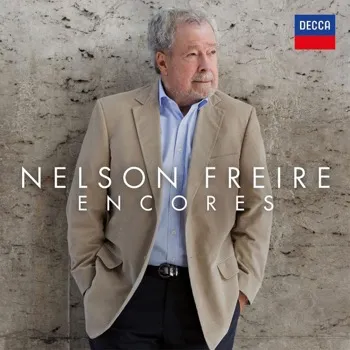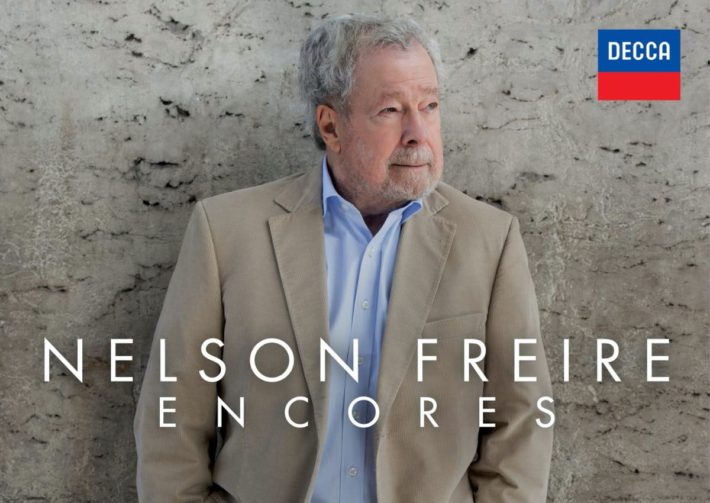Marking his 75th birthday, Nelson Freire celebrates this milestone with an album of highly personal pieces entitled “Encores”, revealing his varying musical tastes across a 70-year career. With a program of popular classics and rarities, Freire acknowledges influences from, and admirations for, a number of 20th-century pianists. He elaborates warmly and infectiously on his choices in his insightful writing in the booklet.

Freire opens with Gluck’s “Melodie” — Sgambati’s transcription of “Dance of the Blessed Spirits” from “Orfeo et Euridice”, a popular encore of choice of many legendary pianists. Whilst there is much to credit from Freire, with the clear projection of the melody and the sympathetic phrasing, the accompanying figures in the middle of the texture are at times overly dominant. Jean-Yves Thibaudet’s recording captures a different mood, less melancholic and more reflective, whilst Yuja Wang’s intense and hushed rendition is truly remarkable.
Two short but lively Scarlatti sonatas follow a brief hornpipe from Purcell. Freire’s ornaments are precise but there is brittleness of tone and uniformity of color across both sonatas. Of the two, the D minor is more controlled and musically convincing than the B minor. A rarity “Aspirations” by Zygmunt Stojowski is laden with highly romantic moments, akin to Rachmaninov, which are well executed. Although having a pleasing right-hand tone, left-hand protrusions distract from this characterful performance.
At the heart of the album is a sequence of a dozen Lyric Pieces by Grieg, from a miscellany of opus numbers, executed with mixed results. Freire begins with the “arietta” op.12 no.1. The right-hand melody has a bell-like tone, but Freire’s richness of sound is distractingly too bold for this work’s simple charm. “Waltz”, op.12 no.2, has crisply articulated playing, but the right-hand phrasing, although very even, lacks characterful shaping. Op.38 no.1 (“berceuse”, track 11) is on the brisk side, missing the gentle rocking ambiance Emil Gilels encapsulates, adopting a broad tempo which emphasizes the tilting motion.
“Little bird” op.43 no.2 (track 13) captures the essence of bird song in the dexterous and clear ornaments. No set of Grieg ‘encores’ would be complete without “Wedding Day at Troldhaugen” (17). Its overt virtuosity suits Freire’s style well, which in turn evokes the joy with conviction, and is one of the highlights of the album. Other selections of Grieg’s piano music can be found from Denis Kozhukhin, whose recent album, covered in these pages, has a sophistication of phrasing that captures the essence of the lyric pieces consistently. Gilels brings a sheer beauty in his masterclass of a recording, whilst Leif Ove Andsnes animates his program with naturalness and beauty on Grieg’s own Steinway.
Moura Lympany’s 1988 recording of miniatures features a work Freire includes on his album (like Freire, Lympany was also a septuagenarian then). Her stylish performance’s of Rubinstein’s “Melody in F”, has a tone impossible to replicate. Freire’s Rubinstein has a similar richness which again fits his virtuosity and bolder sound. Freire’s Granados (“The Maiden and the Nightingale”, track 27) is evocative, whilst Alicia de Larrocha classic recording is imaginative with a sense of reverie. In Albeniz’s “Tango” (29), Freire’s approach is more fluid and brings a different yet personal insight, contrasting with the rhythmically-precise Benjamin Grosvenor.
Freire’s “Encores” overlap with Lympany’s territory further, with the Rachmaninov preludes Op.32 no.10 in B minor and no.12 in G-sharp minor, a long Lympany expertise. The B minor (track 22) is handled impressively, with Freire capturing the desolation effectively with a big sound, but Lympany’s phrasing captures a greater intensity of emotion. Freire’s G-sharp minor (23) contains accomplished right-hand finger work, whilst his left-hand phrasing is different from Lympany, who emphasizes the cantabile nature of the melody.
Decca’s engineers have done Freire an injustice, the recording made in February in Friedrich-Ebert-Halle, Hamburg, is uncomfortably close in the treble. Upper registers of the piano jarring on occasions — as in Grieg’s “Little Bird”, whilst the bass can sound distant — as in the Scarlatti sonatas. Compared to the engineering on Grosvenor’s “Dances” album, Decca captures the reverberant acoustic of Potton Hall, England, atmospherically. A somewhat uneven release, then, but with moments of greatness that show Freire at best.
“Encores”
Nelson Freire – Piano
Decca, CD 4850153




















